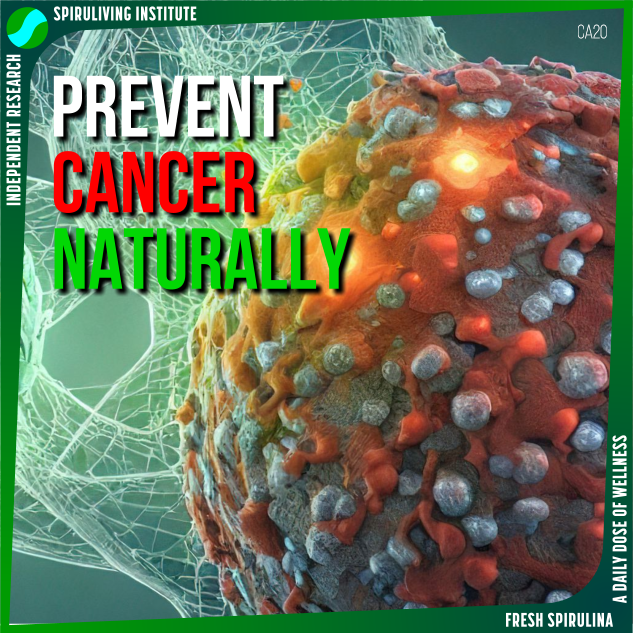
Anti-Cancer Effects of Spirulina - A Review
QUICK SUMMARY
BIOACTIVE ANTI-CANCER PROPERTIES OF SPIRULINA
- Enhances cell nucleus enzyme activity
- Enhances DNA repair synthesis
- Inhibits the growth of human colon carcinoma cells
- Inhibits the hepatocellular carcinoma cells (HCC)
- Inhibits the growth of breast cancer cells
- Antiproliferative activity against the cancer cells
- Inhibits the growth of liver cancer cells, hepatoma and lung cancer cells
- Activates apoptosis enzymes
ANTI-CANCER EFFECTS
Studies have shown that Spirulina extract can prevent or inhibit cancers in animals and humans.
In vitro assessment proposes that polysaccharides of Spirulina improve cell nucleus enzyme activity and DNA repair synthesis.
Water extract of Spirulina inhibited the growth of human colon carcinoma cells and hepatocellular carcinoma cells (HCC) in in vitro studies.
Chloroform extract of crude Spirulina and Chlorella inhibited the viability of breast cancer cells in vitro.
Spirulina has an antiproliferative activity against cancer cells.
Methanolic extract of Spirulina inhibited the growth of human breast cancer cell line and the human cancer cell line L20B within short incubation period.
Extract of Spirulina also prevents the growth of mice intestinal carcinoma cell lines.
A 70% ethanolic extract of Spirulina shows considerable effect of cytotoxicity in human acute leukemia kasumi – 1 and chronic myelogenous leukemia k – 562 cell lines.
Other than these cancerous cells, Spirulina extract inhibited the growth of liver cancer cells, hepatoma and lung cancer cells in mice, oral squamous cell carcinoma in human and hamster, squamous cell carcinoma and oral buccal pouches tumor in hamster.
BETA CAROTENE
One of the most well-known important natural anti-cancer substances is beta carotene.
Studies applying beta carotene to animals showed a statistically significant reduction in tumor number and size.
POLYSACCHARIDES
Polysaccharides isolated from Spirulina improved the repair activity of radiation damage.
Polysaccharides isolated from Spirulina extract inhibited DNA synthesis of sarcoma 180 and ascetic hepatoma cells and inhibited the proliferation of ascites hepatoma cells of mice.
Another polysaccharide of Spirulina inhibited tumor attack and metastasis and caused reduction of lung tumor colonization of B16-BL6 cells in a spontaneous lung metastasis model.
The suppression of glioma cell growth by complex polysaccharides from Spirulina occurs via partial regulation of interleukin-17 production and down regulation of angiogenesis.
Selenium nanoparticles with Spirulina polysaccharides named SPSSeNPs may be a potential candidate against human cancers as a chemopreventive and chemotherapeutic agent.
Oral administration of phycocyanin caused an increase in the survival rate of mice with live tumor cells.
Moreover the phycocyanin isolated from Spirulina showed anticancer activity against squamous cell carcinoma.
Studies detected the regression of tumors induced by DMBA (7,12 dimethylbenz(a)- anthracene) squamous cell carcinoma in hamster.
The oral administration of Spirulina and Dunaliella extract halted tumor development in hamster, due to immune response. Spirulina extract blocks cancer expansion and kills developing malignant cells.
Spirulina and Dunaliella extract are not toxic to normal cells.
C-PHYCOCYANIN
C-phycocyanin (C-PC) isolated from Spirulina inhibited the growth and cell viability of human leukemia K562 cells by different types of mechanisms.
C- phycocyanin (C-PC) of Spirulina has antioxidant and radical scavenging activity.
CPC is an inhibitor of cycloxinase - 2, induces apoptosis (in vitro) and exhibits anti-inflammatory and anti-cancer properties.
Phycocyanin from Spirulina induces apoptosis by the expression of CD59 proteins in HeLa cells.
C-PC prompts apoptosis in HeLa cells by activating apoptosis enzymes, caspases 2, 3, 4, 6, 8, 9, and caspase - 10. In fact, it induces release of cytochrome c from the mitochondria into the cytosol that was related to apoptosis of C-PC-treated HeLa cells.
The PC of Spirulina platensis has possible cancer chemopreventive property.
The selenium-containing phycocyanin (Se-PC) from Spirulina was recognized as a strong antiproliferative factor on human melanoma A375 cells and human breast adenocarcinoma MCF-7 cells.
The Se-PC persuades apoptosis by accretion of sub-G1 cells, and nuclear condensation, DNA fragmentation in both MCF- 7 and A375 cells.
CONCLUSION
Spirulina can be used as medicine for diseases as well as daily nutrient source.
Learn More
Bioactive properties of spirulina - A review of the existing literature
ResearchGate
MICROBIAL BIOACTIVES 2021
SLI-CA20
Spirulina Topics:





